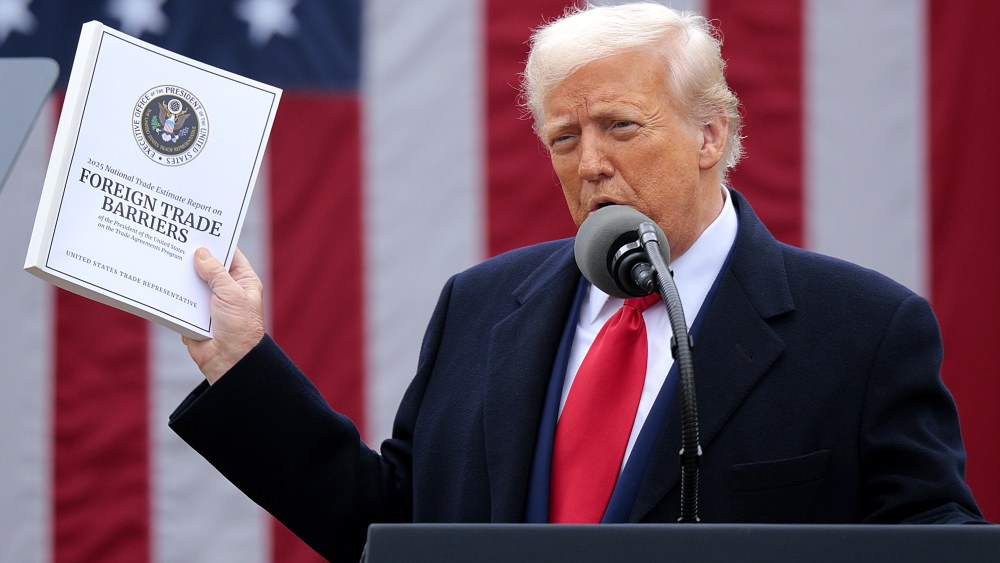President Donald Trump‘s plan to enforce 100% tariff on foreign-produced films was met with shock and disbelief across the European film industry.
It was unclear how the levies, which were announced over the weekend on social media, would be enforced and which productions are most vulnerable to the tariffs. Yet, there are widespread concerns that if they are enacted, Trump’s latest moves have the potential to upend and potentially decimate a global film business that relies on a network of international incentives and foreign locations to make movies.
Everything from low-budget indies to studio blockbusters are currently being made in countries like the U.K., France, Germany, and Hungary. Even Mel Gibson, who is one of the three Hollywood special ambassadors appointed by Trump (the other two are Sylvester Stallone and Jon Voight), is currently planning to shoot his “Passion of the Christ” sequel in Italy.
The reaction in the U.K., where so many U.S. movies are filming, has been the most vitriolic.
“This makes no sense,” a U.K. producer railed. “It implies that a U.S. film is meant to shoot in the U.S. But the ‘Harry Potter’ films, ‘Lord Of The Rings,’ ‘Schindler’s List,’ ‘Mission Impossible,’ ‘Gladiator,’ ‘Aviator’ and so many more are U.S films that shot overseas for obvious reasons. Do these films have to shoot in the U.S. from now on? It’s an absurd announcement with no meaning nor understanding of storytelling or creative impulses.”
Another British producer said, “Even unemployed Americans are saying this is nuts — these are people who have genuinely had their careers shattered because of production moving to Europe.”
Echoes another London-based producer: “If this goes the distance, it will decimate the industry. But you can’t just stop production,” he said. “When does it come into effect? What about movies in pre-production, that are shooting or in post? Would you just double their costs. None of this has been thought through. So I think the calm response is: Let’s see what this means, let’s see the fine print.”
Production in the U.S. is down 40% after Hollywood resolved strikes with the actors and screenwriters unions and some major films, including the next “Avengers” movies, have decamped for the U.K. and other European cities. Incentives are partly responsible for the move, although many states such as Georgia and New York offer generous film funding packages that rival those of other countries. Hollywood lobbying arms, such as the Motion Picture Association, have argued that the U.S. needs a federal film incentive as a carrot to lure productions back. Trump appears to have opted for using tariffs as a stick.
Sources say that Voight and his manager Steven Paul have been taking meetings with various guilds, hoping to get more information about the state of production in order to advise the president on reinvigorating filming in the U.S.
On Sunday, Trump’s message was getting passed around Hollywood, as executives joined emergency meetings to try to make sense of a proposal that’s still dimly understood.
Before the news dropped of Trump’s plan, Gaeten Bruel, who was recently appointed president of France’s National Film Board and previously headed the French Cultural Services in the U.S., feared the Trump administration would start targeting cinema and audiovisual media, and argued that “everyone would lose out, starting with the U.S. industry itself.”
“Europe, and France in particular, are major markets for American works,” which he says represent roughly 60% of the content that people consume in Europe.
Another important figure in France who runs a top festival said, “Technically, films are services on which you can’t impose tariffs. It could end up in court and take months.” While a producer who delivers French blockbusters for which the U.S. is a key market said, “We don’t sell goods, we sell a service, so I don’t see how it could be taxable… It’s difficult to know what we’re talking about at this stage, what it concerns. It’s still very vague and with Trump things can change every day.”
In Italy, Rome’s Cinecittà Studios, which is set to host the shoot of Gibson’s “The Resurrection of the Christ” in September, reacted diplomatically.
“We are observing with the utmost attention the movements of an important market like the U.S,” said Cinecittà CEO Manuela Cacciamani in a statement. “We are convinced that especially in the cultural industry – and the audiovisual sector is at its forefront – exchanges between countries must be as reciprocal and circular as possible.”
“We know how much American productions benefit from our tax incentives, and above all from that ecosystem of beauty, locations, climate, culture, style, knowledge, for which they have always chosen Italy seeking quality that cannot be found elsewhere,” Cacciamani went on to point out.
Others are standing back to see if Trump goes through with his threats are moves on after generating a barrage of headlines.
“We just have to wait and see what Trump’s next move is. It’s like in chess. We don’t know where this is going to go,” said Marco Valerio Pugini, an Italian line producer who was speaking from the Northern Italy set of Ridley Scott’s post-apocalyptic thriller “The Dog Stars.”
“The entertainment industry is a global village,” Pugini added, noting that he just did a Korean show that will go on Netflix. “It’s a bit complicated.”
“But I think the U.S. studios will continue to shoot abroad when they want exotic locations. They aren’t going to start shooting James Bond in Detroit,” he noted.
Executives and filmmakers who make their living in the Middle East are also anxious about what the tariffs could mean for their business. “The entire global production services industry is being hit by this,” said Dubai-based global media advisor Hans Fraikin, who is a former head of the Abu Dhabi Film Commission and founding commissioner of the Quebec Film and TV Council.
“They just don’t know which way to go right now,” he added. “I’m working with a state in India that is working on designing and building a film studio city including soundstages. Obviously they are counting heavily on Hollywood productions. I haven’t talked to them yet. But how are they going to react?”
According to Fraikin, the impact of Trump’s tariffs could be devastating even in the U.S. He is skeptical that the added costs that would come with moving all shooting to domestic locations would substantially increase jobs over the long run. “Ultimately, it’s just going to push the studios to make much heavier use of A.I.,” he argued.
In the indie film realm, sales agents are choosing to view Trump’s declarations as another tantrum. “We should wait and see if it’s true that these tariffs are being applied, when they are being applied, and how they are being applied. There is still no effective date for implementing these tariffs, nor are there specific regulations,” said a prominent Madrid-based sales agent. He added that “American companies could be the biggest losers in this trade war, since sales of American films in Europe do represent a large percentage.”
The agent went on to suggest that if countries respond by imposing a 100% reciprocal tariff on productions that shoot in the U.S., the end result could mean that they turn away from Hollywood films. “European distributors may increase their share of European films and the production and exploitation of local content,” the agent argued.
In the Czech Republic, the film commissioner Pavlína Žipková said that the international nature of moviemaking, which relies on foreign locations and talent, as well as subsidies, has strengthened cultural ties.
“Consider the rich tradition of U.S. studios filming in Europe since the 1950s, which has always been enriching for both sides of the ocean,” Žipková said. “[Trump’s] statement raises more questions than answers.”
But like many members of the European film business, Žipková is gearing up for Cannes, which serves as a hub of film sales, as well as a chance to reconnect with colleagues from the U.S. and other majors markets.
“It doesn’t slow us down,” Žipková said.
Jamie Lang, Naman Ramachandran and Leo Barraclough contributed to this report.
Read the full article here








